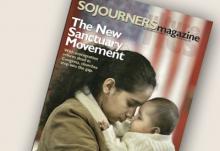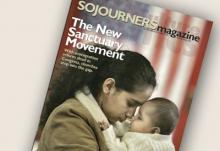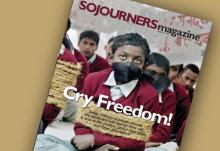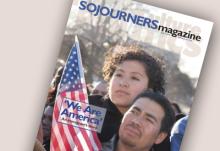Finding sanctuary in a Chicago storefront church.
Immigration
 But for three hiatuses for school, I've lived my whole life in the Twin Cities, and my heritage and skin tone match the Lake Wobegon image of my city and state. I'm the descendant of German, Norwegian, Welsh, and British immigrants. I've even been known to utter "you betcha" on occasion. But the new faces of Minnesota have been on display in the wake of the I-35W bridge collapse on August [...]
But for three hiatuses for school, I've lived my whole life in the Twin Cities, and my heritage and skin tone match the Lake Wobegon image of my city and state. I'm the descendant of German, Norwegian, Welsh, and British immigrants. I've even been known to utter "you betcha" on occasion. But the new faces of Minnesota have been on display in the wake of the I-35W bridge collapse on August [...]
Elvira Arellano, the young mother who sparked the New Sanctuary Movement and appears prominently in the current issue of
In the public debate over immigration reform, President Bush has been pushing a guest worker program that would allow immigrant workers to apply for temporary employment in certain sectors.
Katie Barge at Faith in Public Life has done a great job of rounding up comments (including GP's post by Rev. Derrick Harkins) on the religious community's advocacy on behalf of family reunification in the immigration debate. Her comments:
The current immigration deal under [...]
At a press conference announcing Christians for Comprehensive Immigration Reform, Jim talked about "welcoming the stranger" and "the least of these." Watch it:
See Jim and others respond to questions about the breadth of the campaign
The city council of Maywood, California, declared the town a refuge for undocumented residents in January.
These five weeks of passages extol the depth, breadth, and living power of shalom—the biblical peace for humanity and all that lives.
Thank you for your articles on welcoming the stranger (“A House for All Peoples?” by Ched Myers, and “Looking for Welcome,” by Helene Slessarev-Jamir, April 2006).
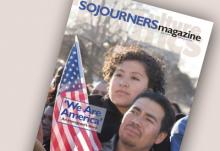
Behind every 'undocumented immigrant' or 'illegal alien' is a real human story. This is one of them.
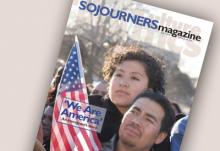
Myth: Immigrants don’t pay taxes. Immigrants pay taxes, in the form of income tax, property tax, sales tax, and other taxes at the federal and state level.
According to a recent Pew Research Center Report, when it comes to stemming the flow of people risking the dangerous border crossing between Mexico and the United States, nearly half of Americans s
Protesters holding an American flag join thousands of people during an immigration rally at the U.S. Capitol in Washington, D.C., in April.
